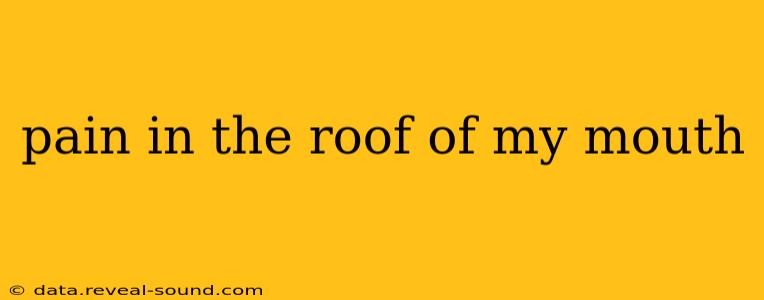Experiencing pain in the roof of your mouth, also known as the palate, can be quite uncomfortable and disruptive. This pain can range from a mild ache to a sharp, throbbing sensation, and its cause can vary widely. This comprehensive guide explores the potential reasons behind palate pain, associated symptoms, and effective treatment options. Understanding the root cause is key to finding relief.
What Causes Pain in the Roof of My Mouth?
Numerous factors can contribute to pain in the roof of your mouth. Let's explore some of the most common causes:
1. Oral Thrush (Candidiasis): This fungal infection, caused by an overgrowth of Candida albicans, often presents as white patches or a creamy film on the palate, accompanied by burning, pain, and sometimes a change in taste. Risk factors include weakened immune systems, use of antibiotics, and poorly controlled diabetes.
2. Canker Sores (Aphthous Ulcers): These small, painful ulcers typically appear on the soft tissues of the mouth, including the palate. While their exact cause is unknown, they're often linked to stress, hormonal changes, or minor injuries. They usually heal within a week or two.
3. Cold Sores (Fever Blisters): Unlike canker sores, cold sores are caused by the herpes simplex virus (HSV) and usually appear on the lips or around the mouth, but can sometimes extend to the palate. They are characterized by blisters that can be painful and crust over.
4. Injuries: Accidental burns from hot food or drinks, or injuries from sharp objects or dental work, can cause significant pain in the palate.
5. Dry Mouth (Xerostomia): A lack of saliva can lead to dryness and discomfort in the mouth, including the roof of the mouth. This can be caused by certain medications, medical conditions, or aging.
6. Allergies: Allergic reactions to foods or other substances can sometimes manifest as pain or irritation in the mouth, including the palate.
7. Oral Cancer: While less common, pain in the roof of the mouth can be a symptom of oral cancer. Other symptoms might include persistent sores, lumps, or bleeding. It is crucial to see a doctor if you have persistent or unexplained pain in your mouth.
8. TMJ Disorder (Temporomandibular Joint Disorder): Problems with the jaw joint can sometimes radiate pain to other areas, including the roof of the mouth.
9. Medications: Some medications can have side effects that include mouth sores or dryness, contributing to palate pain.
What Other Symptoms Might I Experience?
The symptoms accompanying palate pain can help pinpoint the underlying cause. These might include:
- White or creamy patches: Suggestive of oral thrush.
- Blisters or ulcers: Indicates canker sores or cold sores.
- Redness and swelling: May accompany injuries or allergic reactions.
- Dryness and burning: Suggestive of dry mouth.
- Difficulty swallowing or chewing: Could indicate a more serious underlying condition.
- Persistent sores that don't heal: Requires immediate medical attention.
How is Pain in the Roof of My Mouth Treated?
Treatment depends heavily on the underlying cause. Here are some common approaches:
- Oral thrush: Antifungal medications (usually in the form of oral lozenges or creams).
- Canker sores: Over-the-counter pain relievers, mouth rinses, and topical creams.
- Cold sores: Antiviral medications can shorten the duration and severity.
- Injuries: Pain relievers and allowing the injury to heal naturally.
- Dry mouth: Increasing fluid intake, using saliva substitutes, and addressing underlying causes.
- Allergies: Identifying and avoiding allergens.
- Oral cancer: Treatment varies depending on the stage and type of cancer.
How Long Does Pain in the Roof of My Mouth Last?
The duration of palate pain varies significantly depending on the cause. Minor injuries or canker sores usually heal within a week or two. Oral thrush may require several weeks of antifungal treatment. Persistent pain warrants a visit to a doctor or dentist to rule out more serious conditions.
When Should I See a Doctor?
Consult a doctor or dentist if:
- The pain is severe or persistent.
- You have other symptoms like fever, difficulty swallowing, or unexplained weight loss.
- The pain is accompanied by bleeding or sores that don't heal.
- You suspect oral cancer.
This information is for general knowledge and does not constitute medical advice. Always consult with a healthcare professional for diagnosis and treatment of any medical condition. They can accurately assess your specific situation and recommend the most appropriate course of action.
